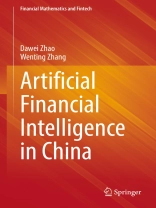This book starts from the application scenarios of artificial financial intelligence regulation, commercial banking, wealth management and payments, etc., and makes a detailed study of the main scenarios of the application of China’s artificial intelligence in the financial field, and also analysis specific application cases of China.
With the popularization of smart phones and the rapid development of e-commerce, mobile payment, big data and other technologies are in the ascendant in China in recent years. In particular, artificial intelligence technologies in the form of facial, speech and semantic recognition are showing preliminary advantages in the field of Fin Tech, and the future era of Intelligent Finance has quietly come. The Chinese government has clearly put forward ‘China should rely on a robust cycle of domestic demand and innovation as the main driver of the economy while maintaining foreign markets and investors as a second engine of growth’, science and technology innovation is the basic motivation of economic and social cycle, to implement the ‘ dual circulation strategy ‘, it is necessary to understand the key role of scientific and technological innovation in financial innovation services, and improve financial services must be driven by science and technology. There is a natural relationship between artificial intelligence and financial services, because financial services are credit and information intermediaries, and data is the most critical for finance, while artificial intelligence has a super ability in dealing with complex data. At present, many Chinese Banks have applied artificial intelligence to their daily operations and management, such as accurate customer identification, enhanced process tracking, intelligent marketing, and product process transformation, so as to simplify financial service processes and shorten service cycles.
In General, this book both pays attention to practical application and theoretical, which is a useful reference book in theoretical research and practical work, and also helps readers to understand the application of intelligent finance in China.
Inhoudsopgave
Chapter 1.Fin Tech towards Intelligent Finance.- Chapter 2.Scientific and Technological Supervision of Artificial Intelligence.- Chapter 3.Technical Path of Artificial Intelligence Compliance Efficiency .- Chapter 4.Smart Payment in China .-Chapter 5.Opportunities, Risks and Breakdowns Brought by AI to Commercial Banks.- Chapter 6.Robo-advisor and Expert Advisor.- Chapter 7.Intelligent Finance Wealth Management in China .-Chapter 8.Intelligent Finance in China’s Financial Market .
Over de auteur
Zhao Dawei, Research Fellow, Ph.D. in Economics, is currently the Deputy Secretary General of the Fin Tech Research Center of the Financial Research Institute of the People’s Bank of China. He holds Bachelor, Master and Doctorate degree of economics all from Central University of Finance and Economics. In 2009, funded by China Scholarship Council, as a visiting scholar, he went to the State University of New York. After Dr. Zhao has join into the People’s Bank of China Financial Research Institute in 2011, he has won the First Award of the “Youth Research Project 2019′ of the People’s Bank of China, the First Award of the ‘2017-2018 the PBC Fin Tech Research Project’ by Fin Tech Committee of the People’s Bank of China, and the First Award of the ‘2018 Fin Tech Youth Thesis’ by Fin Tech Research Center of National Institution for Finance & Development. With a long-term focus on Fin Tech and Reg Tech, Dr. Zhao has published more than 50 academic papers. As the author and co-author, Dr. Zhao has compiled “Technology Rebuild Finance: Fin Tech Utilization and Perspective”, “Chained Future: Blockchain Theory and Application”, “Development Trends and Supervision of Fin Tech”, “China Fin Tech Annual Report (2018, 2019, 2020)”, “Annual Report on China’s Reg Tech Development (2019, 2020)”, and other works.
Zhang Wenting, Ph D in Finance and Investment of Durham University of UK, is currently Senior Research Fellow of the Financial Research Institute of the People’s Bank of China. Dr. Zhang is mainly engaged in the research of International Finance, Inclusive Finance, Fin Tech and the relative policy suggestions. Academic research focuses on the reform of RMB exchange rate system, foreign exchange movement and exchange rate microstructure. She has won the Best Doctoral Thesis Award of Durham University Business School. Dr. Zhang has participated in many domestic and international academic conferences, she has compiled and translated books such as “Bank Credit Operation Management”, “China Community Bank Management”, “Why Not Default” and other works. Dr. Zhang has published dozens of academic papers or articles published on top domestic and international journals, such as International Review of Financial Analysis, China Finance, etc.












